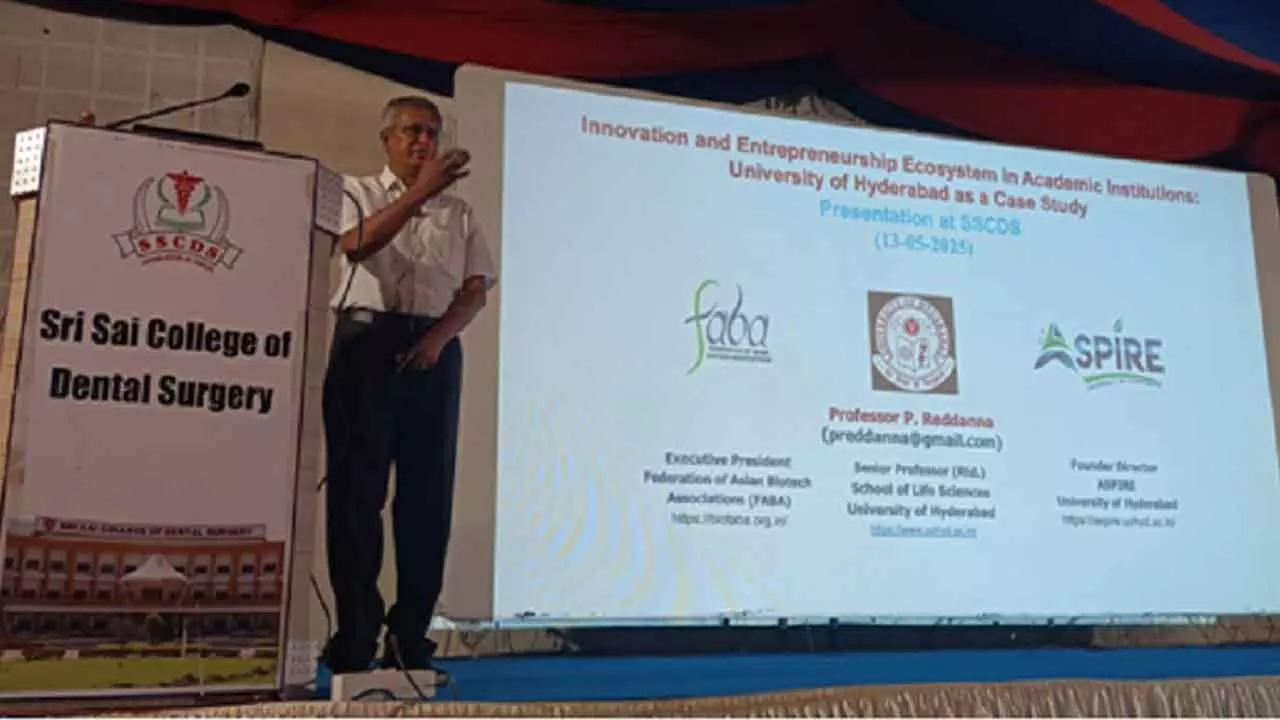UoH Prof Outlines Blueprint For Pharma Innovation In Academia
Says despite India's strong manufacturing capabilities, its share in the global healthcare market remains at only 0.64 per cent
UoH Prof Outlines Blueprint For Pharma Innovation In Academia

Education systems must be attuned to the global environment by promoting creativity and improving the quality of education and training at all levels -- Prof Reddanna, Senior retd professor from UoH
The SSCDS Research Committee hosted a significant event titled "Fostering a Culture of Research and Innovation" recently, featuring Professor P Reddanna, Senior Professor (Rtd) from the School of Life Sciences, University of Hyderabad, as the keynote speaker.
Professor Reddanna, who also serves as the Executive President of the Federation of Asian Biotech Associations (FABA) and Founder Director of ASPIRE, delivered a compelling presentation on "Innovation and Entrepreneurship Ecosystem in Academic Institutions: University of Hyderabad as a Case Study," with special emphasis on pharmaceutical innovation in India.
Highlighting the critical need for innovative drug development in India, Reddanna noted that despite India's strong manufacturing capabilities, its share in the global healthcare market remains at only 0.64 per cent ($638 billion out of a $10 trillion global market). "This modest representation stems from the industry's predominant focus on generics and biosimilars—high-volume but low-value products," he explained, urging a strategic shift toward innovation-driven drug development.
Prof. Reddanna showcased recent success stories in Indian pharmaceutical innovation, including indigenous Covid-19 vaccines (Covaxin, ZyCov-D, GEMCOVAC-OM), novel antibiotics (Exblifeb), biologics, and advanced cell therapies like CAR-T cell treatments developed by ImmunoAct and Laurus Labs. These developments demonstrate India's growing capabilities in creating innovative therapeutic solutions.
The presentation highlighted the University of Hyderabad's ASPIRE initiative as a model for fostering pharmaceutical innovation, having supported nearly 80 startups with 20 founded by faculty, students, and alumni. Through ASPIRE's three specialised incubation centers, entrepreneurs receive comprehensive support from ideation to commercialisation, significantly reducing barriers to entry in the challenging field of drug development. "Education systems must be attuned to the global environment by promoting creativity and improving the quality of education and training at all levels," Prof. Reddanna emphasised, noting the critical role of academia-industry collaboration in building India's pharmaceutical innovation ecosystem.
Dr Nagarjuna Reddy Aculate presented the second lecture focusing on oral cancer management from an Indian population perspective. He provided a comprehensive overview of fundamentals while emphasising the critical importance of biopsy in precancerous lesions for early diagnosis, potentially improving treatment outcomes significantly. Dr Jagadeesh Gandla delivered the third presentation on "Personal Branding and Soft Skills in the Modern Age," beginning with an introduction to FABA's mission of fostering innovation through biotech entrepreneurship, stakeholder unification, cross-border collaboration, and sector protection.
Dr Jagadeesh highlighted that the event was organised under FABA Academy, an initiative launched in 2020 to empower life sciences students, and mentioned FABA's entrepreneurship program "WHALE TANK," with BIRAC serving as a primary funding source for such ventures.

